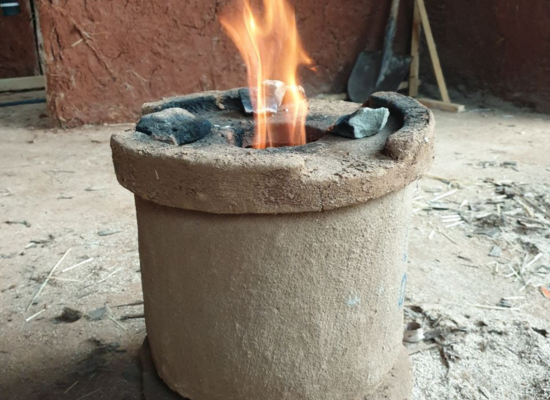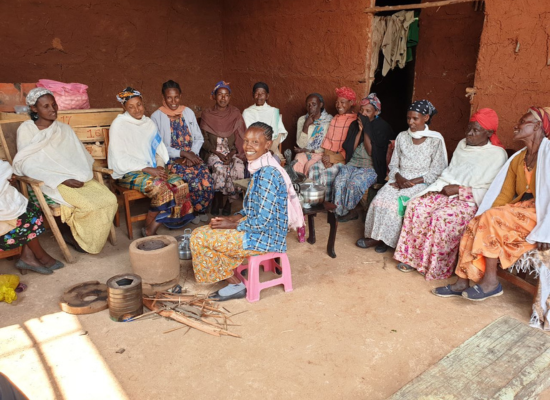From research to business
ClimEtSan-OnTheGround is a spin-off from a research project that was conducted at the German Forschungszentrum Jülich, a research centre in Cologne area. Dr. Katharina Prost, founder of ClimEtSan-OnTheGround, was the project coordinator. In this research project, Katharina’s team investigated methods to connect ecological sanitation, thermophilic composting, biochar and climate-smart agriculture in Ethiopia. When the project was completed, the project results exceeded expectations, but the project team was unable to secure additional funding. So, at this point, Katharina decided to leave science and enter the business world, combining the project's approach with carbon credits funding. The name of the start-up is an abbreviation of the original project name - "Capacity-Building in Ecological Sanitation and Climate-Smart Agriculture in Ethiopia (ClimEtSan)", and “On the Ground” indicates that the project is moving from research to practical approach.
Circular economy approach for climate-smart agriculture
ClimEtSan-OnTheGround has three main products: pyrolysis cookstoves, ecological sanitation toilets and fertilisers. The start-up uses neglected resources as a part of their circular economy approach. They recycle waste from ecological sanitation together with other organic waste and combine it with biochar to produce hygienically safe, nutrient-rich and climate-smart fertilisers. The biochar is obtained from pyrolysis cookstoves. ClimEtSan’s products reduce and remove greenhouse gas emissions, allowing the start-up to benefit from carbon credits.
The pyrolysis cookstoves used by ClimEtSan are an appealing technology – they are easy to build on the ground in the Global South and at the same time they are affordable. The stoves are built from locally available materials such as soil, clay, sand, and straw. “These pyrolysis stoves use 60% less wood than the traditional way of cooking and burn smokeless, which is really important for the users,”
Katharina explained. Because of the fuel reduction, avoided greenhouse gas emissions from the stoves can be used to generate carbon credits. Typically, improved cookstoves in the Global South require government subsidies. This is why they are not widely distributed. They are frequently quite expensive, as production is not cheap. In contrast, ClimEtSan's cookstoves are affordable, because they are made from locally available materials. The users also appreciate the stoves, because they produce biochar. ClimEtSan is purchasing this biochar from the stove users and apply it to the recycling process of different wastes, like organic wastes and waste from eco-sanitation toilets. Because of the recycling, dumping sites will receive less organic waste and will thus emit less greenhouse gas emissions, like methane or nitrous oxide. These avoided emissions can again be traded as carbon credits.
The ecological sanitation toilets are operated only with sawdust. That means they can even be used in environments, where there is only limited access to water, like e.g. in refugee camps. ClimEtSan collects the buckets filled with sawdust and excreta to produce a biochar-compost-fertiliser. Because of its biochar content, the fertiliser functions as a negative emission technology for climate-smart agriculture, again enabling ClimEtSan to benefit from carbon credits.
“Carbon sequestration in soil is urgently needed, because we must not only stop the climate crisis, but we have to reverse it, to bring temperatures back to an acceptable range,”
Katharina mentioned.ClimEtSan aims to certify all avoided and removed emissions under Gold Standard, the highest possible standard for carbon credits.
The main driver of the start-up is contributing to more sustainable agricultural production and tackling the world hunger: “My main motivation is no hunger (SDG 2), because I want to increase agricultural production in a sustainable way. This is my critical point. When you work in the field of organic agriculture, you often come to the point that you have a lack of waste resources that you can convert to organic fertiliser. And this is how we started thinking about human excreta because that is an available organic waste source and they are rich in nutrients,”
Katharina stated.ClimEtSan is cooperating with the patent holder of the stoves, who supports the start-up with his profound experience and expertise. Also they collaborate with another start-up, which is doing consultancy on life cycle assessment for companies, products and processes, especially with regard to greenhouse gas emissions.
Next Steps at ClimEtSan-OnTheGround
The start-up plans to produce and sell the stoves on a larger scale in their partner countries. Starting with Ethiopia, they will build stove workshops, where they train young people and women in producing the stoves, and establish a marketing and sales infrastructure. Thereby they are improving living conditions and creating new job opportunities. Currently, ClimEtSan already has established a pilot workshop in a rural town in Ethiopia and distributed the stoves to a number of test households.
The next step will be the establishment of eco-sanitation facilities as well recycling sites for the fertilizer production. ClimEtSan will collect the full buckets from the toilets, other organic wastes from households and the biochar from the stove users and convert these resources into hygienically safe, nutrient- and carbon-rich fertilizer. This biochar-fertilizer will be part of regenerative, climate-smart agriculture programs that ClimEtSan will conduct in a further step together with smallholder farmers.
To do this, ClimEtSan is currently working on registering a subsidiary company in Ethiopia. After that, the start-up wants to certify the stoves and obtain the gold standard for carbon credits, which they will sell.
ClimEtSan’s work is not restricted to any country. They are also consulting companies in conducting climate project in Europe and open to expand to other countries in the Global South. They already have contacts in sub-Saharan Africa, but also to India.
With their innovative approach, ClimEtSan-OnTheGround, who joined the ISC3 Global Start-up Service in July 2023, is actively contributing to SDG 2 (no hunger), and SDG 6 (clean water and sanitation), SDG 7 (clean and affordable energy), SDG 13 (climate action).



